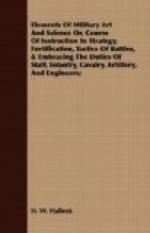But war often fails to procure redress of grievances, or to prevent repeated and continued aggression.
So does a resort to civil force; but such a resort is none the less proper and just on that account.
But in war the innocent party is sometimes the sufferer, while the guilty triumph.
So it often is in civil life: God, for some wise purpose, sometimes permits the wicked to triumph for a season.
But in all wars one party must be in the wrong, and frequently the war is unjust on both sides.
So in suits at law, one party is necessarily wrong, and frequently both resort to the civil tribunals in hopes of attaining unrighteous ends.
But nations do not resort to tribunals, like individuals, to settle their differences.
For the reason that it is believed a tribunal of this character—a congress of nations, as it has been called,—would be more productive of evil than of good. By such an arrangement the old and powerful European monarchies would acquire the authority to interfere in the domestic affairs of the weaker powers. We see the effects of establishing such a tribunal in the so-called Holy Alliance, whose influence is regarded by the friends of liberty as little less dangerous than the Holy Inquisition. Moreover, such a tribunal would not prevent war, for military force would still be resorted to to enforce its decisions. For these and other reasons, it is deemed better and safer to rely on the present system of International Law. Under this system, and in this country, a resort to the arbitrament of war is not the result of impulse and passion,—a yielding to the mere “bestial propensities” of our nature; it is a deliberate and solemn act of the legislative power,—of the representatives of the national mind, convened as the high council of the people. It is this power which must determine when all just and honorable means have been resorted to to obtain national justice, and when a resort to military force is requisite and proper. If this decision be necessarily unchristian and barbarous, such, also, should we expect to be the character of other laws passed by the same body, and under the same circumstances. A declaration of war, in this country, is a law of the land, made by a deliberative body, under the high sanction of the constitution. It is true that such a law may be unjust and wrong, but we can scarcely agree that it will necessarily be so. The distinction between war, as thus duly declared, and “international Lynch-law” is too evident to need comment.
But it is said that the benefits of war are more than counterbalanced by the evils it entails, and that, “most commonly, the very means by which we repel a despotism from abroad, only establishes over us a military despotism at home.”
Much has been said and written about military despotism; but we think he who studies history thoroughly, will not fail to prefer a military despotism to a despotism of mere politicians. The governments of Alexander and Charlemagne were infinitely preferable to those of the petty civil tyrants who preceded and followed them; and there is no one so blinded by prejudice as to say that the reign of Napoleon was no better than that of Robespierre, Danton, and the other “lawyers” who preceded him, or of the Bourbons, for whom he was dethroned.




